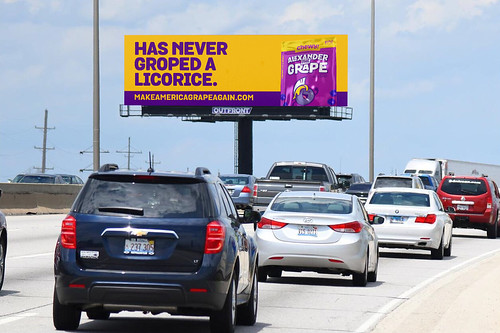3 minutes estimated reading time
Brands using politics as a trope. First up, Kelloggs Korea’s campaign for green onion flavour Chex breakfast cereal. They were allowing consumers to ‘vote’ for the president of Chex.
In 2004, Kellogg’s Korea decided to hold a cute little promotional contest online: an “election” to decide “the President of Chex.” The two candidates were the delicious chocolate “Chekkie,” and the hideously green “Chaka.” Chekkie promised that if they won, they would find a way to add even more chocolate to Chocolate Chex, while Chaka promised to imbue the cereal with stinky green onions. One thing the adults at Kellogg’s were sure of was that kids hate, hate, hate green onions, so Chaka would be an easy fall guy, Chekkie would emerge victorious, and Korean customers would be so excited about Chocolate Chex that they’d purchase millions of boxes.
The Takeout
A Boaty McBoatFace-type polling disaster ensued. And it inspired this tremendously trippy ad.
The second brands using politics trope example was for a grape candy brand by Mann Sales Co. I still can’t work out if its a hoax, but it was doing the rounds on a few ad planning groups. There was an interesting dichotomy. People in the ad planner groups didn’t like it because it fell down from being politically incorrect on so many levels. I personally thought that it went too close to the bone. But then I was was too conservative versus the general publics interpretation of Poundland’s naughty elf campaign. A small unscientific straw poll of friends in the US saw the funny side of it.
Mann Sales Co. and 1908 Candy
Of course none of this is quite as bad as a time when I was working with Chinese clients. American colleagues used campaign marketing in democratic elections as the ultimate brands using politics as marketing trope.
They cited the use of data by the first term Obama election campaign to show how their wonkish staff could aid the client’s marketing internationally and in China. It was all about how Chinese companies could learn from democracy.
It was only when they came out of the meeting that I got to tell them that Twitter was banned in China. It was super awkward.
On work doesn’t happen at work by Jason Fried. A key quote:
some people might say email is really distracting, I.M. is really distracting, and these other things are really distracting, but they’re distracting at a time of your own choice and your own choosing. You can quit the email app; you can’t quit your boss. You can quit I.M.; you can’t hide your manager. You can put these things away, and then you can be interrupted on your own schedule, at your own time, when you’re available, when you’re ready to go again.
Jason Fried
Musique Strategies – oblique and practical strategies for music – what happens when modern music production meats Brian Eno’s Oblique Strategies. This has been put together by Danny Taurus, one of the unsung heroes in UK dance music production. Back in the early 1990s he founded Dansa Records which put together some banging tunes. He’s revived the label and releasing new material from his new base in Los Angeles.
I am not too sure where Apple was going with this working from home ad, but I suspect it was empathy and brand awareness. If you’re working from home, you’ll have experienced all of these challenges by now and know who your technical partners are. It is an entertaining six minutes though and sometimes that’s enough.
Finally, this video is a two-minute work of love featuring the sites and sounds of Hokkaido. It reminds me of the way Sergio Leone’s camera work as tightly linked with the music. In this video the edits and footage both move along with local sounds from Hokkaido, Japan.
